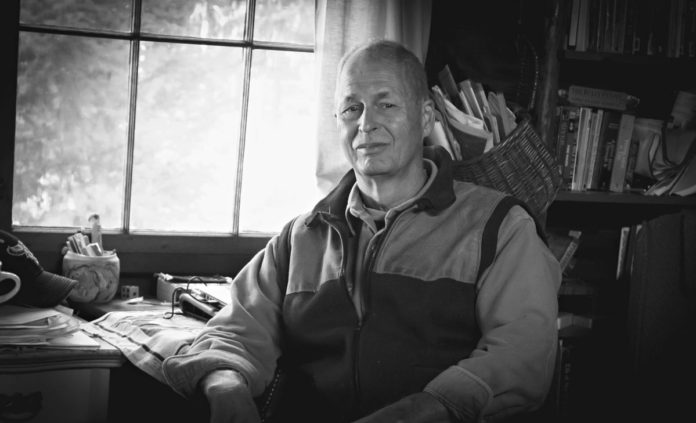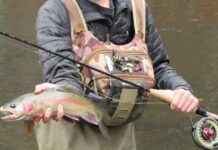Last September was the first time John Maclean picked up his fly rod and walked away from the Blackfoot River without throwing a cast, abandoning the blue-ribbon trout stream made famous by the novella and movie “A River Runs Through It.” The son of the iconic book’s author, Norman Maclean, as well as a journalist and author in his own right, the younger Maclean said, simply put, “there were too many damn people.”
He guessed there were more than 50 cars at the river put-in where he’d stopped, with many of them illegally parked; pausing to watch, he observed a steady procession of boats floating by, while trailered rigs prepared to launch even more boats into the water.
“For the first time in my life I walked away from the Blackfoot when I intended to fish,” he said.
Maclean’s experience highlights the tension between sharing a place of importance with others, and the desire to protect it at the same time, which is fitting considering the theme of this year’s “In the Footsteps of Norman Maclean Festival” in Missoula, where he will appear as one of the literary event’s featured speakers.
Officially, the theme for this year’s festival is “Public Lands and Sacred Ground: Western Writers Bear Witness.” The festival takes place June 25-26 primarily at the Wilma Theater, and according to a press release, writers “will challenge public policy on wilderness, address the history of Indigenous people and their land, and brainstorm to create individual and collaborative means to better ensure a positive future for our public lands and sacred places.”
Topics of discussion will also include the Bears Ears National Monument, the Crazy Mountains, and the Blackfoot Clearwater Stewardship Act, all of which figure prominently into the public lands movement.
Keynote speakers include author, National Book Award and Pulitzer Prize winner Timothy Egan, and Terry Tempest Williams, an educator, conservationist, and author.
Also speaking at this summer’s mostly free, two-day festival will be Shane Doyle, Doug Peacock, Rick Bass, Debra Magpie Earling, John Taliaferro, Peter Stark, Sterling HolyWhiteMountain, Tarissa Spoonhunter, Sally Thompson, BLM director Tracy Stone-Manning, Rob Chaney, Joe Wagner, Mandy Smoker Broadus, John Clayton and Sally Thompson.
The biennial literary festival was postponed last summer, and so this year’s event in Missoula is a makeup. Saturday and Sunday daytime events are free, but people are required to register to attend. One aspect of the festival that isn’t free: a gala dinner the night of June 25, which will include the auctioning of an original Kevin Red Star painting created for the festival, as well as talks featuring Red Star, and former Montana Governor Steve Bullock.
A renowned painter and member of the Crow Tribe, Red Star’s painting depicts the sacred ground of his family in the Pryor Mountains and features Crown Butte mountain foregrounded by tipis and a band of horses.
Festival Coordinator Jenny Rohrer said that, as of late May, there were about 350 people signed up to attend both days of the festival, and that she expects more people to continue to sign up as the start of the festival approaches. The inaugural festival occurred in 2015 in Seeley Lake, but since 2019 has been held in Missoula, largely due to the fact that more and more people have been attending. Rohrer said there wasn’t a venue big enough to accommodate everyone in Seeley.
Similarly, the festival had hoped the Missoula Public Library could host its speakers this year, but by the end of March the number of registrants had exceeded the capacity of an event room at the library. Attendees have come from Europe, Canada and across the United States. Rohrer said that, while the festival began with a focus on Norman Maclean, it has since touched on other related topics, such as “A River Runs Through It” and the Blackfoot River, with the focus continuing to expand this year.
“We started the festival in honor of the MacLean heritage, and what it’s meant for the state of Montana,” Rohrer said, adding that she’s heard stories of festival committee members being asked about “A River Runs Through It” in places as far removed from Montana as the Incan mountain city of Machu Picchu. Maclean moved at a young age to Missoula in the early 20th century, and the family has a cabin on Seeley Lake that was built in the 1930s. Maclean was a longtime literature professor at the University of Chicago and didn’t publish his novella collection “A River Runs Through It” until he was in his 70s.

One of the festival events, for which tickets cost $30, is a hiking tour of some of Maclean’s favorite fishing holes around Missoula.
The novella “A River Runs Through It” was eventually turned into a movie that premiered in 1992. The movie, directed by Robert Redford, included an ensemble cast featuring Brad Pitt. The film largely focuses on questions of family, faith, home, life, and fly fishing, which are frequently grappled with by characters placed amid picturesque Montana landscapes.
“The book and the movie changed the face of Montana,” John Maclean said. “It became a destination for people. Rivers that were once lightly populated with fisherman have just become crammed corridors, and that includes the Blackfoot River.”
Maclean said that in his talk he’s decided to fling caution aside and tell the truth. In part, that means naming the people he thinks are standing in the way of protecting the Blackfoot. He said that, though the resonance of his father’s work and its subsequent film adaptation have strained the waterway, the two forces have also helped spur efforts to improve the health of the river, which at one point was so polluted that the younger Maclean refused to fish there.
Last year John Maclean published “Home Waters: A Chronicle of Family and a River,” a memoir which delves deeper into the Maclean family history, including its love for the Blackfoot River. Maclean said he thinks it’s an optimistic book, although it does describe “a way of life that we cannot bring back fully.”
“That kind of life that I had, and my father had before me is no longer possible, but it doesn’t mean there aren’t good things left. There’s lots of good things left, and some of it can be restored and even enhanced as ‘A River Runs Through It,’ shows by what happened with the Blackfoot River.”
The Blackfoot still fishes very well, Maclean said. But there’s one other problem.
“I will tell you, the fish are a hell of a lot smarter than they were before the book. You used to be able to get away with two or three flies maximum, now you have to match the hatch. The fish are touchy, they see 50 flies a day,” he said.
“The fish are educated.”
For more information go to www.macleanfootsteps.com

Credit: Source link































